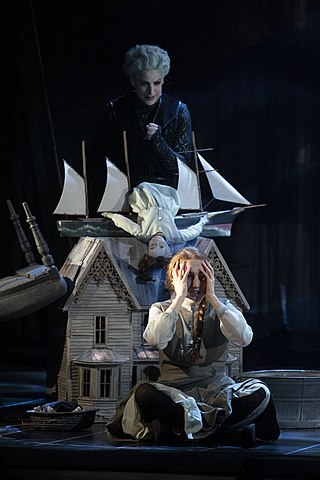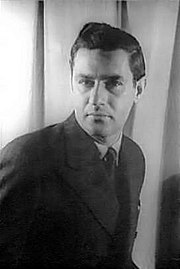
Renata Scotto was an Italian soprano, opera director, and voice teacher. Recognised for her sense of style, her musicality, and as a remarkable singer-actress, Scotto is considered to have been one of the preeminent opera singers of her generation.

The Turn of the Screw is a 20th-century English chamber opera composed by Benjamin Britten, with a libretto by Myfanwy Piper, based on the 1898 novella The Turn of the Screw by Henry James.

The Telephone, or L'Amour à trois is an English-language comic opera in one act by Gian Carlo Menotti, both words and music. It was written for production by the Ballet Society and was first presented on a double bill with Menotti's The Medium at the Heckscher Theater, New York City, February 18–20, 1947. The Broadway production took place on May 1, 1947, at the Ethel Barrymore Theatre. The Metropolitan Opera Company presented it once, at the Lewisohn Stadium, on July 31, 1965.
Patricia Neway was an American operatic soprano and musical theatre actress who had an active international career during the mid-1940s through the 1970s. One of the few performers of her day to enjoy equal success on both the opera and musical theatre stages, she was a regular performer on both Broadway and at the New York City Opera during the 1950s and 1960s.
Claramae Turner was an American operatic contralto, perhaps best known for her appearance in the film Carousel (1956), adapted from the Rodgers and Hammerstein stage musical of the same name.

Muriel Salina Costa-Greenspon was an American mezzo-soprano who had a lengthy career at the New York City Opera from 1963 to 1993.

Ruth Kobart was an American performer, whose six-decade career encompassed opera, Broadway musical theatre, regional theatre, films, and television.
Marie Powers (1902–1973) was an American contralto who was best known for her performance as Madame Flora in Gian Carlo Menotti’s The Medium, a role that she played on stage, screen and television.

Joy Clements was an American lyric coloratura soprano who had a substantial opera and concert career from 1956 through the late 1970s. She notably sang regularly with both the New York City Opera and the Metropolitan Opera during the 1960s through the early 1970s. She also traveled regularly for performances with opera companies and orchestras throughout the United States but only appeared in a relatively few number of performances internationally.

Marilyn Cotlow is an American lyric coloratura soprano best remembered for creating the role of Lucy in Gian Carlo Menotti's The Telephone in both the original Broadway and West End productions. She sang professionally during the 1940s and 1950s in the United States and Europe, performing with such companies as the Metropolitan Opera, Theater Bremen, Theater Basel, and the Wexford Festival Opera. After 1957, Cotlow mainly retired from performance to devote time to teaching voice and being a mother; although she continued to perform periodically in recitals, on the stage, and on disc up into the 1990s. She has taught vocal music on the faculties of the Peabody Conservatory, the University of Michigan, and Catholic University of America in addition to teaching privately from her home in Northern Virginia. Several of her students have had successful careers, including Alessandra Marc and Jennifer Wilson.
The Medium is a 1951 Italian drama film directed by Gian Carlo Menotti. It is based on the opera of the same name and was entered into the 1952 Cannes Film Festival. It would later be screened out of competition at the 1987 Cannes Film Festival.
Lee Venora is an American operatic soprano and musical theater actress. She was highly active with the New York City Opera between 1957 and 1967 and a regular performer at the San Francisco Opera between 1961 and 1966. She also appeared in a few Broadway musicals, Lincoln Center revivals, and national tours of musicals during her career. Composer and conductor Leonard Bernstein was an admirer of her voice, and she performed with him and the New York Philharmonic on a number of occasions during the late 1950s and early 1960s. She also sang with the orchestra on a couple of recordings and appears on a few musical recordings as well.

Amelia al ballo is a one-act opera buffa by Gian Carlo Menotti, who set his own Italian libretto. Composed during 1936 when Menotti was in his mid-twenties, it was the composer's first mature opera and first critical success. The opera recounts a series of farcical events as a young Italian socialite overcomes obstacles to her attendance at the first ball of the season.

Help, Help, the Globolinks! is an opera in four scenes by Gian Carlo Menotti with an original English libretto by the composer. It was commissioned by the Hamburg State Opera and first performed as Hilfe, Hilfe, die Globolinks! in a German translation by Kurt Honolka on December 21, 1968, in a double bill with Menotti's Amahl and the Night Visitors. The opera had its English language premiere on August 1, 1969, in the United States at the Santa Fe Opera in a double bill with Igor Stravinsky's The Nightingale. Both premiere productions were directed by the composer. Many of the cast members from the Santa Fe production reprised their roles for the work's New York debut at the New York City Opera in December 1969.
Freda Betti, whose birth name was Frédérique Thérèse Augusta Betti, was a French mezzo-soprano singer whose career was mainly confined to France. She left a range of recordings representative of her repertoire.
Gloria Lane Krachmalnick was an American operatic mezzo-soprano who had an active international performance career from 1949 to 1976. In her early career she distinguished herself by creating roles in the world premieres of two operas by Gian Carlo Menotti, the Secretary of the Consulate in The Consul (1950) and Desideria in The Saint of Bleecker Street (1954); both roles which she performed in successful runs on Broadway and on international tours. For her performance in The Consul she was awarded a Clarence Derwent Award and two Donaldson Awards.

Gian Carlo Menotti was an Italian-American composer, librettist, director, and playwright who is primarily known for his output of 25 operas. Although he often referred to himself as an American composer, he kept his Italian citizenship. One of the most frequently performed opera composers of the 20th century, he wrote his most successful works in the 1940s and 1950s. Highly influenced by Giacomo Puccini and Modest Mussorgsky, Menotti further developed the verismo tradition of opera in the post-World War II era. Rejecting atonality and the aesthetic of the Second Viennese School, Menotti's music is characterized by expressive lyricism which carefully sets language to natural rhythms in ways that highlight textual meaning and underscore dramatic intent.
The Medium is a 1960 Australian television production. It was a filmed version of the opera by Menotti.
Barbara Zechmeister is a German operatic soprano and voice teacher. A member of the Oper Frankfurt from 1996, she has appeared in major European opera houses and international festivals. She has performed in world premieres, and in recitals and recordings. Zechmeister has been a voice teacher at Dr. Hoch's Konservatorium since 2005.
Joanna Mary Bruno, also known as Joanna Bruno-Clarke, is an American operatic soprano who had an active international career during the 1960s and 1970s. A lyric soprano, she often performed in operas by Giacomo Puccini and Wolfgang Amadeus Mozart.








